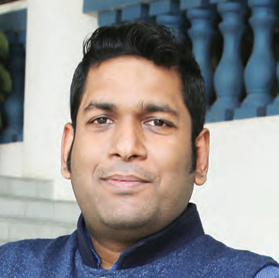HR to Strategic HR Paradigms of HR post-pandemic

A spot poll with leading HR gurus on the changing role of human resources in the challenging world post-pandemic. Living and working as we do in strange times when tried and tested are giving way to the untried and untested, the HR leader’s role has been enhanced in a way that it never has before. No more are they just the “recruitment chaps,” they are strategic business partners who ensure the right fit to your organisation, study the attrition rate, and help you hold onto valuable talent. They are the vital bridge between management and employee, that brings forth a two-way communication and comprehension from both sides. A far-from-easy task given that even with fears of a massive recession, The Great Resignation has not been deferred. The pandemic changed a lot of people’s attitudes towards their own lives; no more is it simply about taking a salary month on month in the name of “security”; employees have realised life is short and time, precious. Thus, an organisation may ignore work-life balance at its own peril. At the same time, what exactly are the aspirations that an organisation would expect from new recruits, freshers or otherwise?
Here’s chatting with the HR honchos in the middle of the ring…

Be flexible for flexibility promotes creativity
Across all sectors, the pandemic taught people to care. Without a doubt, HR’s role has been significantly enhanced since then. From recruitment to ensuring people’s growth, to showing people that they are cared for, HR has a lot of challenges to meet. We are living in interesting times. People have realised they can earn money but growth, experiences, work-life balance and more-that’s what is prompting the Great Resignation. So yes, HR must take into account a lot of changing realities, not least, the perception of time. There were days when we used to define careers in a broad time frame: 10 years for manager, 20 for director, 30 for CXO and so on. But now, I have a country director with just eight years work experience and raring to go. So, it’s all about learning and opportunities. One must be flexible and open to the on-ground realities. Flexibility is a great thing to have because it promotes creativity. If you give time for people to settle down, they contribute well to the organisation and its growth with ideas and processes. About the worldwide recession, I would say we have seen it before-so what? It’s nothing to fear, for those who are constantly upskilling themselves. As a counsellor, I always tell people to have parallel careers, one that could stem from their interest as opposed to the one they already have, which is a result of their training and education. And why not? It brings income and opportunity and joy. For instance, I have always wanted to model and when the opportunity arose, I started. It’s been a very interesting and engaging experience for sure.
-NEERAJ SHARMA,
Director People Operations, India, Cavista Technologies Pvt. Ltd.

Weaving work experiences around moments that matter
The pandemic has enhanced the role of HR like never before. Finally, HR has a seat at the table and is taken seriously as a business partner. During that unprecedented time, HR had to consider people’s working lives along with what they were going through personally. And that marked a major shift in gears for the days to come, from coaching for work-related performance to coaching for life skills. As work-life harmony becomes a goal to strive for, one thing’s clear that we are going to have a hybrid work atmosphere with remote working. So, the big challenge before HR is weaving work experiences around moments that matter. That will prevent the Great Resignation from happening. The conversation around mental health and well-being has gotten bigger than ever before. The question arises, how can HR enable processes by which the right help reaches people at the right time? One way is through the apps we make available to the employees focused on well-being and mental health. Over and above all this, how do you prepare the work force for a hybrid environment? To my mind, there are two important elements to this. First, how do you train managers to deal with a remote or hybrid workforce and help them experience your organisational culture and learning quotient? Immense mentoring is required to train effective managers. Second, how do you train employees to manage their performance and productivity from home by minimising distraction? These are very important arenas for HR. Last but not the least, it was relatively easier in the physical world for HR to have tough conversations with employees on performance and output for instance; but through video conferencing where it is very tough to gauge people’s body language-how do you have these conversations to yield the right results? These are the greatest challenges in the days to come and thus HR has an amplified role.
- RUPALI VEERKAR,
Vice President and Head HR, Bitwise India

Take initiative to grow, learn and seek out opportunities
Among the key lessons that the pandemic brought in its wake was the fact that people and businesses have to align with each other, they can’t be isolated and thus HR has a big role in helping people understand business. During the pandemic, a lot of businesses had to let people go; I am not saying that this could have been evaded but being that bridge and letting people understand the core values and the need to upskill were important roles for HR. Post pandemic a lot of companies fast-tracked their succession or innovation planning and upskilling programmes with the realisation that realities change fast. As new recruits, it is understandable that they have expectations for growth, keeping six months or a year in mind. A two-way communication ensuring that the values of the organisation align with the individual is a very critical factor. But please understand that while help is available it’s up to the individual concerned to take the initiative to grow, learn and seek out opportunities. At the end of the day, you are an adult and it’s your career we are talking about and making or breaking it, is upto you. There is no dearth of mentorship, but you must look for it; don’t expect the mentors to seek you out. People are happy to help if you have that enterprise and zeal to make your career. Similarly, it is important to know your skills before you apply for a particular role. Time and again, experience and research have shown that it’s the people who take the initiative, succeed and grow.
- AKSHATHA KARANGUTKAR,
Associate Director- HR, Samhita Social Ventures

We are back to Maslow’s hierarchy of needs
A lot has changed across industries post-pandemic. No more is it only about earning a good salary or a title; it’s much more than that for the new generation, hence, this phenomenon called the Great Resignation. And, report after report is confirming this shift in priorities. It is a fact that this new generation values work-life balance and is asking deeper questions about all that they want to do with their lives and HR has to keep this in mind as they map out employee policies and career management plans. Safety, security and well-being were the three pillars that were seen as the most important and Covid-19 changed all that. We were struggling for health. So, post-pandemic people have evaluated their attitudes towards life and goals. People want their time to matter in more ways than one.
Also, the concept of flexibility differs from person to person. Employees need time to develop hobbies and pursue goals that matter to them. This is not something to be taken lightly. Remember Maslow’s hierarchy of needs that places the need for self-actualisation or realising one’s highest potential, at the top of a human being’s priority. Well, we need to keep it front and centre these days.
With regard to individuals, they need to remember that as opposed to the emphasis on marks, competition and individual goals in college, corporate life is all about collaboration and teamwork. Resilience is very important. This is a fast-track generation and is used to quick rewards and returns but corporate careers are about taking delays and disappointments in one’s stride. Along with that, an agile mindset and understanding that digital is the future are important.
- ANUSHRI VERMA,
Associate Director - HR, IQVIA

For HR, understanding business is equally important
HR has always been a critical function, but post-pandemic, businesses big and small have woken up to the fact that it’s actually also supposed to be a strategic partner. HR is no longer a typical feature of big MNCs but something organisations across the board, need-not just have HR as those ‘recruitment guys’ but an active business partner who gets the right people to the organisation. What’s more, HR is also realising that viewing themselves as just coordinators is not the way to go, understanding balance sheets and business is equally important-they have begun to value themselves that much more.
In the pandemic, especially in a retail business like ours, where most work can happen only at store, HR had to engage employees meaningfully and carry out training programmes that would make use of their time well and take up the learning quotient a few notches higher.
As for new recruits, I would say they need to be flexible, patient and willing to carry out different functions. This generation is outspoken and energetic, but they need to realise that to make a difference in an organisation, as an HR person, you have to stick around for three to five years in order to make a difference.
- PRIYANKA VANJARI,
Head - HR and CRM, PN Gadgil Jewellers Pvt. Ltd

Looking for change in terms of soft skills
HR’s role is changing, it was changing even before the Covid pandemic, but it was more person centric. If you were very dynamic and you were living by those values, you were actually leading in the front and also be a business partner. But, since pandemic things have changed drastically because no action was being taken without the consideration from HR-it is something new and there was no handbook to follow. For example, while setting goals-there was no possibility of meeting goals. How do you do someone’s appraisal? How do you manage the timelines, the attendance? So, everywhere HR was involved. There were HR professionals who started giving guidelines even before the Covid pandemic hit and lockdown was declared. So, all that created net promoting score for the organisation and HR played a very important role. Now work is in hybrid mode and people are back in office. But yes, the value that HR created during those times and the environment that we are in, which is ever changing-HR’s role has become very important today. Regarding technology-overnight things had to be done-you brought in some software, but they were not fully ready, but we had to deploy them. Now the work is going on, getting the best out of those softwares. But overall, leading the change humanely were the HR enabling the managers. I would give hundred per cent credit to managers-during pandemic we realised how important their role is and HR’s role was to enable them and that’s how it is going to be in future as well.
Regarding expectations from the freshers and new recruits-the change is in terms of soft skills. More of emotional intelligence and remaining self-motivated, because there were people during pandemic who could not manage themselves, forget about managing others. And, there were others who were not in the leadership role but yet they rose to the occasion and not only they motivated themselves, they motivated others also. Alignment with organisational values has become very important today, because you realised during the pandemic that connect with values is very important when there is a crisis and this was a crisis of very large scale. So, values alignment is the second thing that we are looking at. And the most important is resilience. So, resilience, connect with values, self-motivation and emotional intelligence, is what we are looking at.
- GAURI DAS,
Head-HR, Marketing and Admin, India Factoring and Finance Solutions Pvt Ltd

Expectations of from employees have gone through a sea-change
The Covid pandemic has brought in unprecendent changes the world has ever seen. It has changed beyond the dimensions of how an organisation or society or economy, for that matter functions. Obviously it has affected the business organisations in every aspect, compared to the way we were working earlier and how we are working now-taking into consideration the hybrid or remote work model-some of the organisations have accepted this phenomenon. I come from a manufacturing industry, so the time we got to accept this reality was a very short period. Yes, people are required to be given more time to accept change, if you want to sustain and grow your business. We fortunately and proactively implemented various changes during the pandemic and even post pandemic times. It was the testimony for all of us to check and try these changes, whether they can work or not. Today we can happily say that yes we work-from-home and we have done a good job during the Covid time. This WHF, Flexi-time and hybrid work models have now become part and parcel of our work life and policy-this is the reality whether you accept it or not. Companies are working fine, but expectations of employees and from employees, and employee relationship has gone through a seas-change. These changes are going to impact everyone.
Regarding fresh recruits, I would say that, if the core values of the institution they are trained from are discipline, determination and dedication, they would surely contribute to the success of the organisation, which is going through lot of challenges. What is important is that HR is not the only area where they can do something, there are lot of other domain areas where a person would like to make their career-it will be there individual choice rather than what we expect from each of them.
- DINESH KHONDE,
General Manager, Human Resources, Burckhardt Compression India Pvt Ltd

Studying attrition rate as part of HR analytics is a major change
From being the leave and recruitment guys in the nineties to active strategic partners in business, HR has gone from strength to strength over the last three decades. A key area of change in the portfolio is HR analytics-studying the attrition rate and understanding why people are leaving. Either, one’s product is not making the impact it should or the competitor is taking advantage of a factor that isn’t your USP. One has started studying human tendencies to understand what a person can do or cannot. Looking at the skills that are available versus those that are not and are likely to be needed, is an important aspect of those analytical skills. In the same vein, analytical skills are what one would expect from new joiners. Sure, the reality of corporate life is different from what one learns at the institution, but a basic induction into statistics, for instance understanding what a statistical coefficient actually is, will go a long way in making things easier for you in the corporate environment. Another desirable trait is the self-starter attitude, taking initiative, thinking different and going that extra mile to contribute. There is also an increased focus on operational excellence, that is to say, striving for efficacy throughout an organisation’s processes. Thanks to remote or hybrid working environment, it’s no longer about employee engagement but employee experiences. So, a person with a feel of the work culture and expectations from him is bound to do well.
- SUMIT SARASWAT,
Human Resources Specialist, Tietoevry

Trust and transparency replaces command and control
The world is looking at the Covid-19 pandemic as a situation which made us take a step back, as a situation of stagnation. I look at it as a situation of opportunities-it’s a less of a threat and more of an opportunity, because it has helped us to reflect on what we have been doing incorrectly in the past. Over a period of time HR has emerged as a command and control support function, but the pandemic actually gave us the opportunity to introspect if it makes sense to remain as a command and control function-how about moving into a trust and transparency function. Command and control has actually got replaced by trust and transparency. In all those businesses where people said that we cannot work from home or its not practically possible in our industry, HR got an opportunity to ensure that you are able to come up with processes and redefine your process, so that you are moving to more trust and transparency. So, over the pandemic, I think, it was a great opportunity for HR to bring trust and transparency to the forefront and that has helped us move away from command and control. A lot of changes are expected from freshers particularly. Predominantly, freshers are expected to be part of business from day one. I don’t think corporates have the luxury of wasting time, effort and money, in giving a learning to freshers. Learning happens at whatever age, there is no end to it, but it will be great if you can tell the organisation, what is that you are bringing to the table. Twenty years of your life on this planet is twenty years of experience. So, freshers can also bring their perspective to the organisation. If freshers and students start looking at themselves as value adding contributors to the business, the business will see lot of value in recruiting them. So, how you turn it around instead of asking for jobs, are you putting forward your candidature, I think that’s an expectation. We are looking forward for students who are putting forward their candidature and not asking for jobs. When you are working hybrid, what organisations will expect is how transparent you are about your challenges and about whatever work you are doing-organisations will expect a healthy conversation, so that they don’t have to monitor what you are doing.
- HARINI SREENIVASAN,
Partner, Semcostyle

It’s all about how far the organisation is willing to go
For HR taking care of people and taking care of the organisation’s needs, has always been in the forefront. When I look at within my HR team, my department, I think there is a big burn out, because they have been available for people for 24x7, trying to do things online and trying to ensure employees queries are responded to, when there is no interaction or visit. I think, it is important that once an employee sends out an email, the expectation is, there is a response. So, being available 24x7 during the phases of the pandemic, have been extremely stressful for organisations, because of what their employees and their families went through. In a WHF mode of working interacting with employees has been a challenge for HR. Culturally WHF or remote working has not been a new concept for us, but when it comes to face-to-face interaction and driving a certain level of engagement and culture, I think those are the things we are not even thinking and talking, given that there is no connect. That’s been a reasonable challenge for the HR teams. Even driving the engagement programmes online, there is only so much that you can do. But, at the same time business has realised that if you can deliver without being in the office, how important it is as far as culture is concerned or mental health or wellness is concerned, and does that really matter. So, it all depends how far the organisation is willing to go to appreciate some of these things. Even if we are working in hybrid working model or WFH, getting to know your organisation and what it stands for and also being able to creatively find avenues to connect and not just probably sit back, is what we want the new hires to know. We want new hires to join us as high potential entry level employees and expect them to continuously be curious in different ways. In the absence of orientation programmes and communication, they should find ways and means to connect. So, engagement and curiosity are very important keys. So, staying curious and connecting, engaging with the organisation is what I would expect the new hires to do.
- NEETAL VAIDYA,
Vice President -Human Resources, TIBCO Software India Pvt Ltd

It’s a people-centric system now
As we are in the VUCA world, everything is volatile and uncertain. There’s a lot of ambiguity and it’s complex. So, the role of Human Resources (HR) has changed pre and post-pandemic. Also, the mindset that HR is all about social and cultural dos is irrelevant; the pandemic has changed it to a different level. During those challenging times, we were more concerned about how, being in the manufacturing industry, people could work from home. The whole machine-oriented system moved towards being more people-centric, because machines can be programmed, but people cannot be. Their well-being was more important by looking at different aspects. The interview process or the onboarding entirely changed to digital, and it was so quick, thanks to our innovative approach.
The HR which was more process-specific turned more human-oriented. We also extended our help to the employees’ families and helped those who needed hospitalisation. We ensured the daily wage earners had enough food and other essentials. HR is no more a sitting job; we were and continue to be on our toes. Also, it is not about the position that you carry, or the paper or the desk work that you do, it’s more that you connect through heart-to-heart bonding. We also went back to our people who had resigned from our organisation, to know whether the companies they applied for accepted them; if not, whether they would like to come back. As a strategy, we as an organisation, agreed that we would not fire anybody or let people go, till this whole pandemic situation settles down. So you know, probably for two months if they can survive, have salaries in place, because that’s what they needed. Our new joiners were worried, so we digitally onboarded them. So, they’ve been practicing in their hometown, and are aware of what the processes are. What was important was to keep them engaged. Now we have adopted the hybrid working method. We also do a lot of outsourcing in various areas so that our staffers could be more productive in their core jobs.
- PRIYA BHIVARE,
Sr Manager Talent Management, ARaymond India Pvt Ltd

HR now has to be a dependable support system
In the changing role of HR role, the most important thing is that the business world has understood that the human resources department is not just about coordination, but also entails a huge amount of planning. The pandemic has scripted a new role for HR and expectations from it has increased a lot. While the business of any organisation is revenue based, HR ensures that the people who are getting the revenue are treated well and are prompted well, in terms of Learning & Development (L&D) and their well-being is taken care of.
The pandemic has taught us how an emergency can come at any time, and you as an organisation have to really support the employee, holistically. Forget the barriers that were there, forget the legacy-you have to establish yourself as a dependable support function.
As for expectations from fresh and new recruits, it’s you who is responsible for your growth and development. Keep yourself updated on your skills on your own, as we do not borrow skills from others to grow ourselves. I have two eyes to study with and to gain my degree. Similarly, if it is my job, I have to sustain my skills and keep myself updated to make my own presence felt in the company. Don’t expect any spoon-feeding-it’s you who has to do it. Keep yourself updated, on what’s happening in the economy, and if it is getting impacted, it is you and every individual who is going to be impacted. So, you have to be updated about what’s happening in the corporate world.
- PALLAVI SARKAR,
Head Shared Service – India & Site HR Head, Corporate Office, Schaeffler

Employees are looking at more flexibility and autonomy
There has been a huge change in the way HR looked at things and also how others looked at HR. After the pandemic, employees now understand the value of family, health and wellbeing. These are just as important as our professional lives. Employees are looking at more flexibility, autonomy and a hybrid model of working. There is a need for looking at things differently. HR needs to see what can be done for employee’s initiatives of health and wellbeing. Post pandemic, where people were forced to stick to a job because of job security, now they know which companies don’t align with their value system and which companies didn’t provide them with a sense of security during the pandemic. For HR, being able to provide the human touch, keeping the employee more engaged, needs to be the key. Health and wellness needs to be a holistic experience. A lot of HR tools and automation leveraging technology will be crucial. How managers can engage people remotely? How HR can check in on these employees and are able to provide a right experience, is crucial. As for the expectations of HR from new recruits, the new recruits need to be able to bring in a lot of freshness and newness in the system. They should be able to think differently, think with a different lens, and have the courage to speak up. HR and top management also want a lot of changes, but not all of it has to come from employees. Being tech savvy, being able to collaborate well, is another expectation. The new hires need to come with an open mind, must be able to express themselves, and must have a lot of curiosity and excellence in their approach. That’s how they must position themselves.
- REETI VERMA DAYAL,
Deputy General Manager - HR, Garware Technical Fibres

Every day comes as a new opportunity for HR
I feel HR is already a backbone of the organisation, but post covid-19, it has become a cricket field. When the opening batsman comes, they have no idea what kind of ball will be bowled, but if the don’t bat, they will be clean bowled. Similarly, every day comes as a new opportunity for HR, and they have to deal with it. Post covid, a lot of responsibilities have come upon HR. We lost a lot of good business leaders, and HR is finding it tough to replace them, as hiring has stalled and they have to groom internal leaders from teams. Another important change is that earlier, HR was only doing the core HR work, but now they have really taken up the role of business partners. They are now stakeholders, enjoying business meet-ups, having global meetings, multi-tasking, and showcasing empathy, compassion and resilience. It is tough for HR to give four days work-week to some people, offline work to some and work from home to others, but somehow they are managing every situation. HR is now becoming a doctor also-they are managing mental wellness along with physical health.
Organisations are now looking for a complete package from new recruits. They are looking for a person with the right skill-sets, a zeal to learn more, and I feel now we are in an era where HR is looking more at soft skills and more of humanity in people. Other skills can be developed, but humanity is something that must be inherent. That gratitude, that humility, that feeling of thankfulness towards your organisation must be there. We always look towards betterment but the grass is always green on the other side.
- SHAIFALY SANGAL,
Founder & CEO, Yung Minds

There has been a paradigm shift in power dynamics
HR has become more empowered, more responsible and more dependable in the aftermath of the pandemic. HR role has been redesigned in the organisation. HR roles have been reassessed. What we are expected is to not do transactional work, but to do transformational work. We need to ensure that the empathy quotient is embedded in the employees. HR also needs to look at everything from a human aspect. HR also is expected to balance business and the human touch. Nowadays, everything has become HR centric. HR is not just a department, it is a function, a thought.
Nowadays, with the new crop of recruits coming in, I feel HR is in the firing line. The new recruits are empowered. There has been a paradigm shift in the power dynamics. If you look at it from a selection point of view, where you have everybody in the same pool, I think the qualities we look for is having the last mile information, what is their social media presence, and what is their communication strength. When I say social media presence, I do not mean their Instagram followers. What we are looking at is the kind of activities they have done. How active are they on social media? What is the content of those activities? Whenever you hire for HR, or sales and marketing, which are people facing functions, we get to know from social media if people are in reality what they show themselves to be. I don’t think that if you ask freshers about the organisation or other technical things, they are even expected to know the answers. Neither have we paid them to know it. What they are expected to know is what they have studied. Do they have a hold on what they have studied?
- ASHISH BANKA,
Director - Talent Acquistion, Delhivery

There is now an increased awareness about our industry
The main requirement HR has is related to expectations. If you look at Gen Z, the requirement is very different. Now college students have questions for us such as, “Is it going to be a hybrid model?”, “Is it going to be work from home?”, or “Will it be an online interview?” People abroad have now gone from their offices and started working remotely from their own towns and villages. However, my industry is healthcare. We can’t leave our patients and work from home. But the model does help us in other ways. Today, I can take the interview of a person sitting in any part of the country. There is a lot of focus on the health aspect of employees. For us, the health hygiene of an employee becomes very important from the time he enters the organisation. Covid may be waning, but the next epidemic may be round the corner. There is an increased awareness about our industry, which wasn’t there before. What we have realised in the last couple of years is the importance of annual medical checkups and the importance of women’s health, especially in terms of mammography.
Today the youngsters are smarter. They already come with expectations. In the case of HR, we have to ensure that their expectations are met. Freshers come with an expectation that they will be better oriented in the system, they will have simple hygiene factors, better mentorships, etc. The highest attrition you have will be in the first six months. You need to ensure that you touch base with employees. You have to also ensure that their learning curve is steep, because one of the main reasons people change jobs is because they want to keep learning.
- ANNIE MATHEN,
General Manager - HR, Apollo Hospitals, Navi Mumbai

Retaining talent has become a priority for HR
As regards to the changing role of HR, I would like to look at it from a two-point lens, wherein one would be on the talent side and the other would be on the culture side. Both of them have been impacted. In the aftermath of the pandemic, there has been a considerable war for talent, which has created a lot of issues with the Great Resignation coming in. That has skewed the supply-demand in certain technology roles, which is creating a great divide. I think, these are challenging times for HR to understand and know what would help employees stay back, and retaining talent has become a priority for us. Culturally, we are still evolving to become a hybrid organisation. Some companies are insisting as a mandate for employees to come back in to work and they are facing a tough time, because there are other companies which are giving a lot more flexibility. In the long run, hybrid is here to stay. Culturally, what this means is that we would have to provide a lot more flexibility to employees in picking their mode of work. As regards new recruits, I would tell them to have some faith and trust in the organisation they have joined. We all make career moves, but you have to trust your intuition that the company you joined is a great one. We all are equally responsible in making a company a great organisation. You have to stay long enough in a company to contribute. Of late, the spans are getting shorter and that is creating a huge problem in the industry. Understand the history and legacy of the company you are joining and also how it operated. Know the operating models and then start your work.